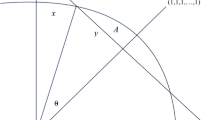Abstract
Recently, a test of congruence among distance matrices (CADM) has been developed. The null hypothesis is the incongruence among all data matrices. It has been shown that CADM has a correct type I error rate and good power when applied to independently-generated distance matrices. In this study, we investigate the suitability of CADM to compare ultrametric distance matrices. We tested the type I error rate and power of CADM with randomly generated dendrograms and their associated ultrametric distance matrices. We show that the test has correct type I error rates and good power. To obtain the significance level of the statistic, a single (as in the Mantel test) or a double (as in the double permutation test, DPT) permutation procedure was used. The power of CADM remained identical when the two permutation methods were compared. This study clearly demonstrates that CADM can be used to determine whether different dendrograms convey congruent information.
Similar content being viewed by others
References
Colless, D.H. (1980), “Congruence between Morphometric and Allozyme Data for Menidia Species — A Reappraisal,” Systematic Zoology, 29, 289–299.
Edgington, E.S. (1995), Randomization Tests (3rd ed.), New York: Marcel Dekker.
Estabrook, G.F., Mcmorris, F.R., and Meacham, C.A. (1985), “Comparison of Undirected Phylogenetic Trees Based on Subtrees of Four Evolutionary Units,” Systematic Zoology, 34, 193–200.
Faith, D.P. (1991), “Cladistic Permutation Tests for Monophyly and Nonmonophyly,” Systematic Zoology, 40, 366–375.
Farris, J.S., Källersjö, M., Kluge, A.G., and Bult, C. (1994), “Testing Significance of Incongruence,” Cladistics, 10, 315–319.
Holm, S. (1979), “A Simple Sequentially Rejective Multiple Test Procedure,” Scandinavian Journal of Statistics, 6, 65–70.
Lapointe, F.J., and Legendre, P. (1990), “A Statistical Framework to Test the Consensus of Two Nested Classifications,” Systematic Zoology, 39, 1–13.
Lapointe, F.J., and Legendre, P. (1991), “The Generation of Random Ultrametric Matrices Representing Dendrograms,” Journal of Classification, 8, 177–200.
Lapointe, F.J., and Legendre, P. (1994), “A Classification of Pure Malt Scotch Whiskies,” Applied Statistics, 43, 237–257.
Lapointe, F.J., and Legendre, P. (1995), “Comparison Tests for Dendrograms: A Comparative Evaluation,” Journal of Classification, 12, 265–282.
Legendre, P., and Lapointe, F.J. (2004), “Assessing Congruence among Distance Matrices: Single-Malt Scotch Whiskies Revisited,” Australian and New Zealand Journal of Statistics, 46, 615–629.
Mantel, N. (1967), “The Detection of Disease Clustering and a Generalized Regression Approach,” Cancer Research, 27, 209–220.
Mickevich, M.F., and Farris, J.S. (1981), “The Implications of Congruence in Menidia,” Systematic Zoology, 30, 351–370.
Page, R.D.M. (1996), “On Consensus, Confidence, and Total Evidence,” Cladistics, 12, 83–92.
Penny, D., Watson, E.E., and Steel, M.A. (1993), “Trees from Languages and Genes Are Very Similar,” Systematic Biology, 42, 382–384.
Planet, P.J. (2006), “Tree Disagreement: Measuring and Testing Incongruence in Phylogenies,” Journal of Biomedical Informatics, 39, 86–102.
Podani, J. (2000), “Simulation of Random Dendrograms and Comparison Tests: Some Comments,” Journal of Classification, 17, 123–142.
Robinson, D.F., and Foulds, L.R. (1981), “Comparison of Phylogenetic Trees,” Mathematical Biosciences, 53, 131–147.
Rohlf, F.J. (1982), “Consensus Indices for Comparing Classifications,” Mathematical Biosciences, 59, 131–144.
Sokal, R.R., and Rohlf, F.J. (1962), “The Comparison of Dendrograms by Objective Methods,” Taxon, 11, 33–40.
Steel, M.A., and Penny, D. (1993), “Distributions of Tree Comparison Metrics — Some New Results,” Systematic Biology, 42, 126–141.
Templeton, A.R. (1983), “Phylogenetic Inference from Restriction Endonuclease Cleavage Site Maps with Particular Reference to the Evolution of Human and the Apes,” International Journal of Organic Evolution, 37, 221–244.
Author information
Authors and Affiliations
Corresponding author
Additional information
We would like to thank the members of the LEMEE (Laboratoire d’Écologie Moléculaire et d’Évolution) of Université de Montréal for their constructive comments on a preliminary version of this manuscript as well as three anonymous reviewers. This study was supported by NSERC and FQRNT scholarships to VC and by NSERC grants OGP0007738 to PL and OGP0155251 to FJL.
Rights and permissions
About this article
Cite this article
Campbell, V., Legendre, P. & Lapointe, FJ. Assessing Congruence Among Ultrametric Distance Matrices. J Classif 26, 103–117 (2009). https://doi.org/10.1007/s00357-009-9028-x
Published:
Issue Date:
DOI: https://doi.org/10.1007/s00357-009-9028-x




